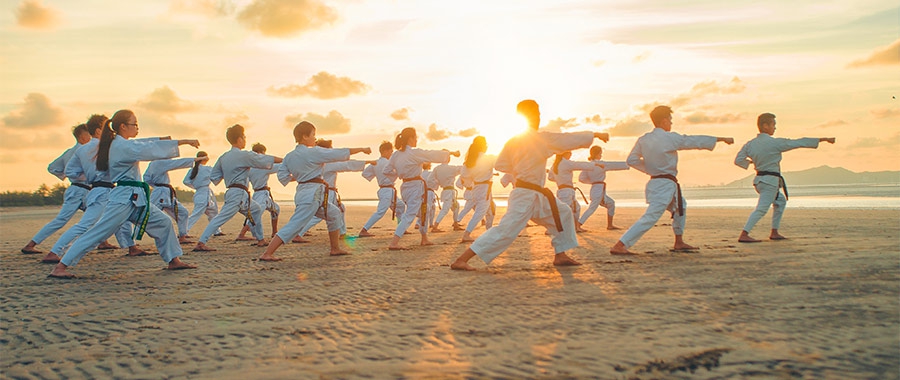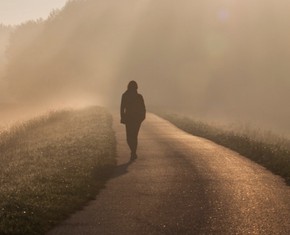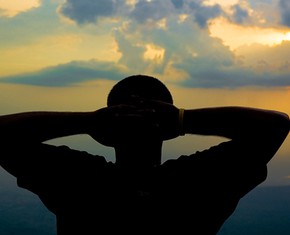The views expressed in our content reflect individual perspectives and do not represent the authoritative views of the Baha'i Faith.
Raised on Bruce Lee films, I first got interested in martial arts as a kid—but as an adult, I’ve tried to combine that interest with my spiritual life.
That may seem like a contradiction in terms—after all, the first word in martial arts means “warlike” or “military”—so how could it co-exist with a peaceful religion like the Baha’i Faith?
Let’s see if I can explain. During my childhood, I watched lots of Kung Fu movies and mimicked the moves in my bedroom. I didn’t really start practicing martial arts until my university days, and even then, only on a minimal basis. At the time I also began my spiritual quest for God, and simultaneously I just happened to meet someone who practiced Jeet Kune Do, the martial art Bruce Lee practiced.
After doing Jeet Kune Do informally for a year or two with my friend, my peace-loving self started to question whether martial arts was compatible with a spiritual life. I personally found that because I was essentially learning how to hurt people, violence was on my mind more often wherever I went—so I stopped training.
Almost twenty years later, my son and wife joined a Karate class. My son got really into it, but not my wife. We didn’t want to waste the sessions she had already paid for, so I decided to use them, and once again my affinity for the martial arts rekindled.
I loved being in my white, flowing gee. It felt so tranquil and minimalistic. But while donned in monkish garb, I was still learning how to harm people, and so the questions from 20 years past resurfaced again. This made me look into what the Baha’i teachings say about martial arts, and in particular, self-defense.
To start with, the Baha’i teachings forbid Baha’is from killing others, even in self-defense: “Know ye that to be killed in the path of His good pleasure is better for you than to kill.” – Baha’u’llah, The Summons of the Lord of Hosts, p. 111.
The Baha’i teachings explain that Baha’is aren’t pure pacifists—that an individual Baha’i has the right to defend himself or others when confronted with violence. However, even when Baha’is are physically attacked, which still takes place in countries like Iran and Yemen, they should not retaliate in kind: “Organized religious attack against Bahá’ís should never turn into any kind of warfare.” – Ibid. The letter goes on to say:
A hitherto untranslated Tablet from Abdu’l‑Baha, however, points out that in the case of attack … a Baha’i should not surrender himself, but should try, as far as circumstances permit, to defend himself, and later on lodge a complaint with the government authorities. – Ibid.
To me, this basically means that if the police are not at hand to call on at the moment of an attack, Baha’is have the right to defend themselves.
This suggests that from a Baha’i point of view, it is perfectly permissible for a person to defend his or herself when being attacked. However, The Universal House of Justice went on to explain that:
The question is basically a matter of conscience, and in each case the Baha’i involved must use his judgment in determining when to stop in self-defense lest his action deteriorate into retaliation. – Ibid.
Since self-defense is essentially then a matter of conscience, like many aspects of Baha’i life, and our conscience should be guided by the Word of God, I wondered—how do the words of Baha’u’llah relate to the matter?
Ye are the fruits of one tree, and the leaves of one branch. Deal ye one with another with the utmost love and harmony, with friendliness and fellowship. – Gleanings From the Writings of Baha’u’llah, p. 288.
This obviously means that Baha’is don’t attack others, and if others become hostile towards us, we try to resolve things peacefully. Our first line of defense should be words. We should try to de-escalate things verbally, so that no physical altercation takes place at all. But if we truly love others, we might think that we shouldn’t hurt anyone, even in self-defense. However, we also have to remember that love should be coupled with justice. Baha’u’llah wrote: “No light can compare with the light of justice.” – Epistle to the Son of the Wolf, p. 28.
Even though we love others, we also uphold the principle of justice. If someone senselessly attacks me, their action is unjust, and if their action is unjust then I am justified in defending myself. But even more noble than defending ourselves is defending others. Baha’u’llah advised all of his followers to always strive to be “an upholder and defender of the victim of oppression.” – Gleanings From the Writings of Baha’u’llah, p. 285.
To me, defending victims of injustice represents the main merit of martial arts—to protect others. While it is perfectly permissible to defend ourselves, it is even more noble to protect others from getting harmed by an aggressor.
Last year I saw a horrific video on BBC World News of a man repeatedly stabbing a woman to death in public. No one intervened. Clearly the right thing to do would be to step in and stop this from happening. Clearly, though, putting ourselves in danger for the sake of others requires some measure of selflessness: “Blessed is he who preferreth his brother before himself.” – Tablets of Baha’u’llah, p. 71.
If I prefer others to myself, I won’t hesitate to put my life at risk in order to save another person’s life.
Preferring others to ourselves means looking out for those around us. So, when we see someone getting attacked, we will not just think about our own safety and run away; we will step in to try to defend that person.
But defending and protecting ourselves is also vital. Even if I don’t regard my own life as the most significant and important, my friends and family certainly value it. They want me to stay alive. Not only that, in regard to my son, he needs me to stay alive. He is dependent on me for food, shelter and love. I have a responsibility to him to protect myself from harm. This value, taught in ancient China, maintains that if we act with a social conscience, we will protect our own health and safety since we are part of a social network of mutual support.
Of course, if we truly prefer others to ourselves, we will also prefer the aggressor to ourselves. But this does not mean that we should just let such a person senselessly harm or kill us. Out of respect for him or her, we should first try to reason with the person. If, however, they don’t listen and proceed to try to injure us, we should defend ourselves.
Another thing to remember is the inner dimension of martial arts. You will notice that many martial arts end with the suffix “do”: judo, taekwondo, aikido, hapkido, karate-do. Wait a minute, isn’t just called “karate”? That’s the westernized term. But what does “do” mean anyway? Do is derived from the Chinese word Tao, which in this case is a “way” and very much an inner way. Traditionally when someone studied martial arts, they were doing two things, learning a fighting technique and also learning how to gain mastery over their own self through this technique.
As you may know, this second aim is one of the fundamental aims of the Baha’i Faith. Baha’u’llah reminded us to:
… resolve to gain the victory over your own selves, that haply the whole earth may be freed and sanctified from its servitude to the gods of its idle fancies. – Gleanings From the Writings of Baha’u’llah, p. 93.
In the Baha’i teachings, prayer, meditation and service, among other things, serve as ways to purify the inner self. But since we are justified in defending ourselves and others, it seems that Baha’is too may choose to study martial arts and utilize it as a further means of attaining self-mastery through developing discipline, clarity, courage and selflessness.
















Comments
Sign in or create an account
Continue with Googleor